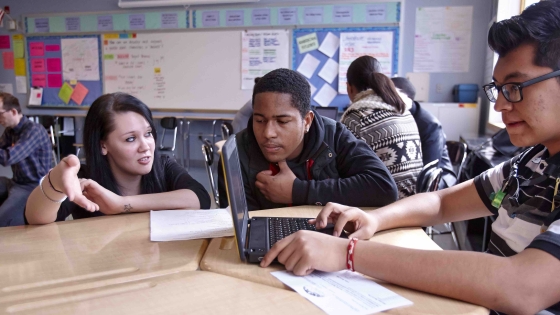
Educator Reflections on Transforming the High School Experience for Black and Latino Young Men
By Sarah Klevan and Adriana Villavicencio (May 2016)
Researchers and practitioners increasingly recognize that a positive school culture not only enhances students’ day-to-day experiences, but also plays a role in raising student achievement. Yet many schools struggle to create a welcoming and supportive schoolwide culture. Indeed, there is evidence that students of color in particular—and perhaps most notably Black and Latino young men—often face cultural barriers at school.
Beginning in 2012, New York City’s Expanded Success Initiative (ESI) provided 40 NYC high schools with financial resources and professional development to help them create or expand supports for Black and Latino young men. Many of the schools implemented strategies that were either implicitly or explicitly aimed at improving school culture.
Drawing on interviews, focus groups, and case studies conducted as part of the Research Alliance’s ongoing evaluation of ESI, Strategies for Improving School Culture highlights ESI schools’ efforts to strengthen school culture in four key areas:
- Developing Culturally Relevant Education (CRE). Educators received training in CRE and reported using a variety of approaches to make their curriculum and instruction more relevant to students’ everyday lives; to foster an environment that affirms students’ cultural backgrounds; and to address underlying teacher biases about students.
- Adopting Restorative Approaches to Discipline. In a conscious effort to reduce the use of suspensions, educators described implementing new practices (e.g., peer mediation, conflict resolution training) and prioritizing positive relationships with students as a way to manage behavior.
- Promoting Strong Relationships in Schools. Educators described programs (e.g., mentoring, adviseries) designed to support relationships between students and school staff, as well as between students and their peers.
- Providing Early Support for Postsecondary Goals. Educators reported shifting their expectations from high school graduation to college readiness; they described strategies aimed at increasing students’ sense of belonging in college and providing support for the concrete steps involved in preparing and applying for college.
The report also identifies three important values that connect and help undergird the strategies educators describe: teaching as reflective practice; taking responsibility for student learning and success; and building on student strengths.

